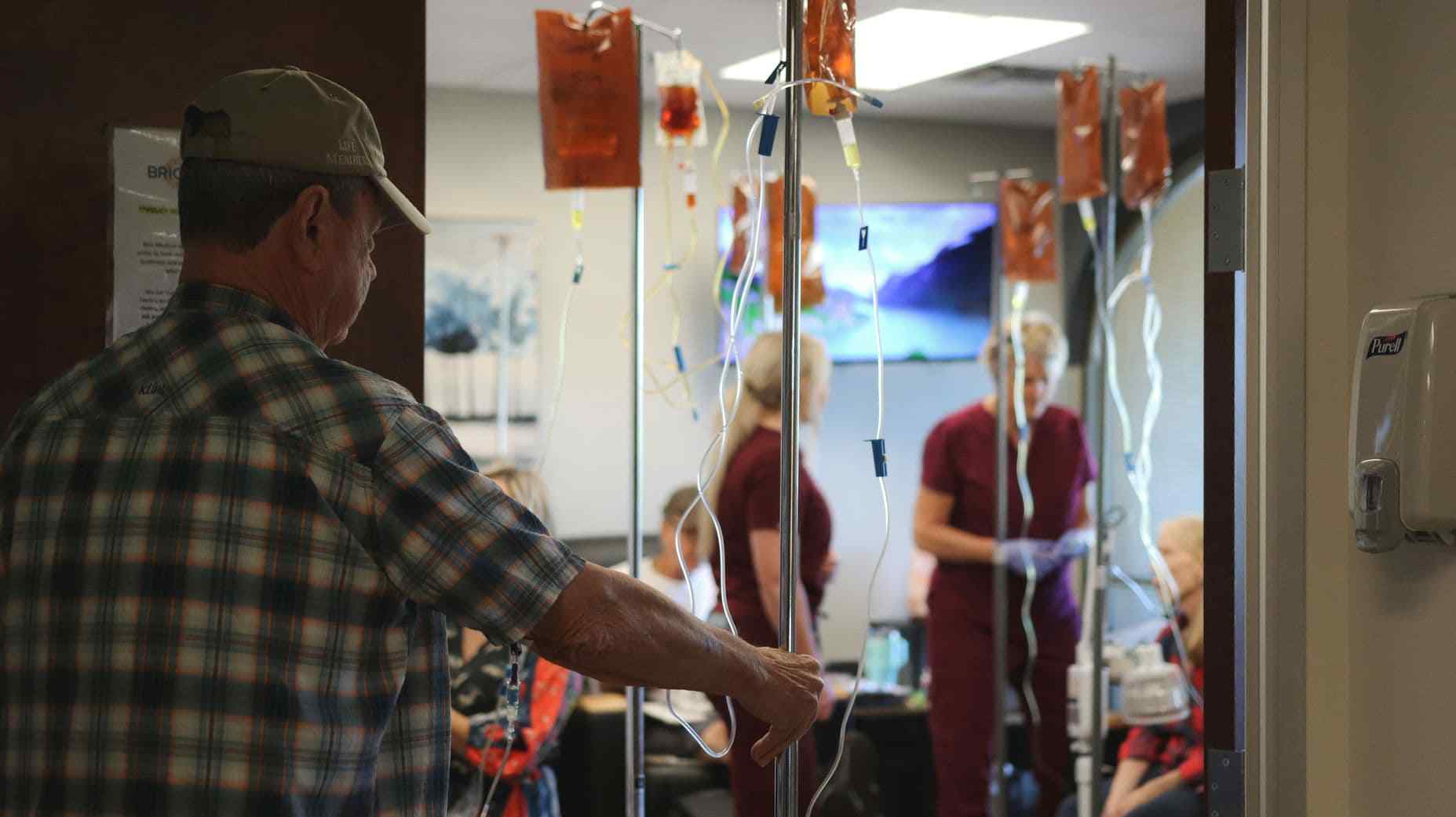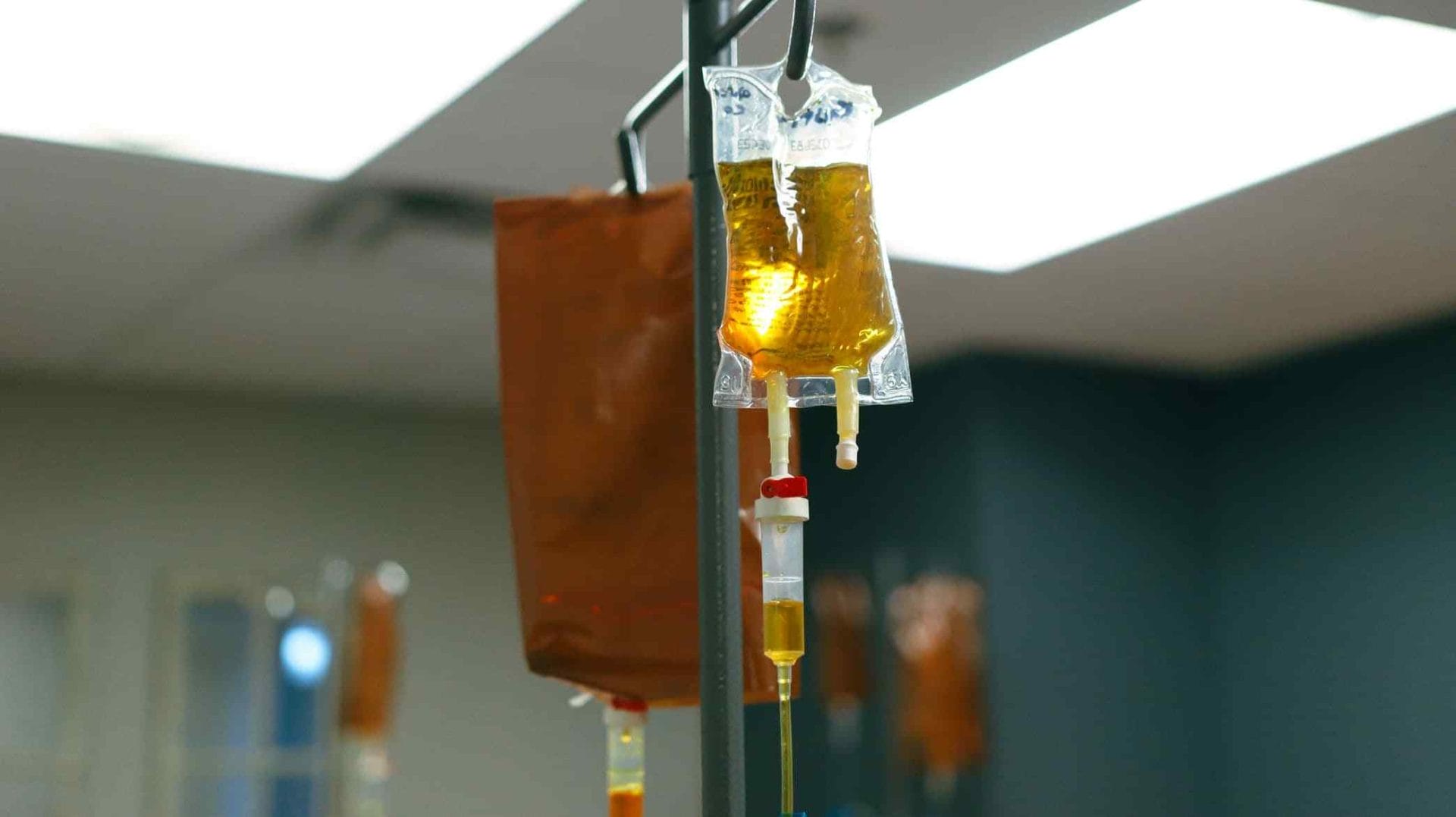IV Curcumin Therapy Program
Curcumin is one of the most active curcuminoid compounds found in turmeric. A bioactive substance, it is known to have medicinal properties and is renowned for its ability to inhibit and fight inflammation at a molecular level.
The curcumin content of turmeric is only around 3% and as a result, is poorly absorbed into the bloodstream. Taking turmeric as a spice or in a tea is not an effective way to reap the health benefits of curcumin.
When taken intravenously, 100% curcumin will be 100% absorbed into your blood and body where it can work its magic. And, rest assured, it won’t turn your skin yellow!

A study carried out by Julie S Jurenka, reported that “Based on early cell culture and animal research, clinical trials indicate curcumin may have potential as a therapeutic agent in diseases such as inflammatory bowel disease, pancreatitis, arthritis, and chronic anterior uveitis, as well as certain types of cancer.”
Another study looking at the Efficacy of curcumin in the management of chronic anterior uveitis found that patients suffering from this condition could benefit from taking oral doses of Curcumin.
The final study, which looked at anti-inflammatory agents, had results that indicated “that aspirin and ibuprofen are least potent, while resveratrol, curcumin, celecoxib, and tamoxifen are the most potent anti-inflammatory and antiproliferative agents of those we studied”.
IV Curcumin is a polyphenolic compound and the main active ingredient found in turmeric. Curcumin naturally possesses anti-inflammatory properties and is a powerful antioxidant, making it a common antidote for soothing digestive issues and reducing joint pain associated with arthritis.
Studies on curcumin’s effects on various forms of cancer report the compound’s potential to interfere with cell signaling pathways to prevent proliferation and metastasis while supporting cancer cell apoptosis.
Intravenous infusions of curcumin supplements directly introduce the compound into the affected area without requiring invasive surgery or other conventional cancer treatments.
Curcumin IV therapy helps to prevent cancer growth and potentially helps to reduce tumors and prevent the spread of cancer cells to other parts of the body for cancer patients.
Studies also suggest that some of curcumin IV benefits may help to modulate chemotherapy and potentially reduce side effects experienced by the cancer patient.

How does IV Curcumin affect cancer cells?
Curcumin is the bioactive component of turmeric, a commonly used spice. It has been extensively studied for its anti-inflammatory and anti-cancer properties. IV Curcumin therapy is effective in reducing the growth of various types of cancer cells.
Curcumin has been shown to inhibit the growth and proliferation of tumor cells, induce apoptosis, and inhibit tumor angiogenesis, metastasis, and invasion. Curcumin also has the ability to sensitize tumor cells to chemotherapy and radiation therapy, thereby increasing their efficacy.
IV Curcumin therapy is a potent antioxidant that neutralizes free radicals and reduces oxidative stress, a major contributor to cancer development and progression. Curcumin is also an immunomodulatory agent that enhances the immune system’s ability to fight cancer cells. It has been shown to increase the production of natural killer, T, and B cells, which are crucial for immune function.
- Curcumin can inhibit carcinogen bioactivation by suppressing specific cytochrome P450 isozymes and inducing the activity or expression of phase II carcinogen-detoxifying enzymes.
- It’s a strong detoxifying and antioxidizing agent through various mechanisms.
- It decreases inflammation and interferes with cell growth by inhibiting protein kinases.
- Curcumin is a highly pleiotropic molecule found in the rhizomes of Curcuma longa (turmeric). It is responsible for the yellow color of turmeric. It has been shown to inhibit the proliferation of cancer cells and be useful in preventing or treating several diseases. [1]
Curcumin is one of the most promising phytochemicals that target various cancers and inflammation-mediated diseases. [2]
Do Cancer Patients Benefit from IV Curcumin Infusions?
It may be given by intravenous (IV) infusion – through a vein into the bloodstream. When taken by intravenous infusion, Curcumin can reach much higher levels in the blood than when the same amount is taken orally.
It improves the quality of life by positively influencing the physical, mental, and emotional functions and relieving symptoms such as fatigue, nausea and vomiting, pain, and loss of appetite.
Curcumin treatment targets show that it acts on major intracellular components involved in key processes such as genomic modulations, cell invasion, and cell death pathways. [3]
IV Curcumin treatment has been shown to modulate multiple cell-signaling pathways simultaneously, thereby mitigating or preventing many different types of cancers, including multiple myeloma and colorectal, pancreatic, breast, prostate, lung, head, and neck cancers.

Benefits of Curcumin IV Therapy for Cancer Patients
Curcumin also has profound anti-cancer effects on the body. Firstly, the spice is anti-angiogenic (Maheshwari et al. 2006). That is to say, and curcumin stops the formation of new blood vessels to supply growing tumors.
Furthermore, the anti-metastatic effects of this constituent inhibit the spread of cancer around the body. Likewise, curcumin is anti-mutagenic, preventing the mutations leading to cancer (Maheshwari et al. 2006).
Lastly, curcumin induces the death of cancer cells by regulating the expression of genetic material. Curcumin increases P53 expression – a gene that controls the normal life cycle of a cell – by inhibiting another transcription factor called NF-kB (Wilken et al. 2011). In addition, the constituent helps induce cell death in cancer cells by upregulating a gene called P21 (Gogado et al., 2011).
Another action of curcumin is as an inhibitor of the enzyme mTOR, a kinase that increases cell growth, proliferation, and motility during cancerous states (Beevers et al., 2013). Ultimately, while a chemo drug will typically target one cancer-causing signal at a time, the benefit of using curcumin is that it works more extensively by stopping 195 of these signals (Pescatore 2016).
As such, many cancers may be prevented and treated with curcumin (Anand et al. 2008), including:
- Bone cancer
- Melanoma
- Thoracic and Head & Neck cancers (lung, oral, & thymus)
- Gynecologic cancers (cervix, ovary, uterus)
- Breast Cancer
- Brain Cancer & Giablastomas
- Genitourinary Cancers (bladder, kidney, prostate)
- Gastrointestinal cancers (esophagus, intestine, liver, stomach, pancreas, colorectal)
- Hematological cancers (leukemia, lymphoma, multiple myeloma)
What is Curcumin?
Derived from turmeric, a spice that is a mainstay of Indian cooking, Curcumin has been relied upon as an anti-inflammatory to treat arthritis and muscle and joint pain. However, new studies from top cancer researchers have discovered that Curcumin reduces cancer growth and can distinguish between cancer cells and non-affected cells.
During the last two decades, hundreds of studies from esteemed cancer research centers such as the University of Texas MD Anderson Cancer have shown that Curcumin treatments significantly reduce the rate of cancer cells in human and animal subjects. It attacks cancer at the earliest stages and prevents blood flow to cancer cells, slowing its growth and improving recovery rates.
While it’s ineffective against all types of cancer, studies show it’s effective again breast, pancreatic, prostate, lung, and colon cancer.
How IV Curcumin Treatment Works:
Curcumin runs interference against toxins and enzymes that contribute to cancer growth. Also, it seeks out abnormal cells and induces apoptosis, the programmed death of a cell. With cancer cells, the life cycle is interrupted, and cell growth is inhibited. Many cancer treatments seek to cause cancer apoptosis later in its life cycle, but Curcumin causes this at the G2 stage, a lower cancer stage. Low-grade cancers tend to grow and spread more slowly than high-grade cancers.
Curcumin also prevents angiogenesis, forming blood vessels from existing blood vessels. For cancer to thrive, it needs a blood supply like regular, healthy cells. However, this enhances its spread to other tissues. Curcuminoids prevent angiogenesis to cancer cells, starving them of nutrients and slowing their growth.
What’s even more interesting is how Curcuminoids regulate cell growth. It promotes healthy cell growth while slowing tumor growth. According to a 2005 study in Biochemical Pharmacology, Curcuminoids shut down transcription factors, which regulate the growth of tumor cells. In addition, thanks to its anti-inflammatory properties, it prevents inflammatory molecules from activating, which furthers cancer growth.
IV Curcumin FAQs
What is IV Curcumin?
IV Curcumin is a method of delivering curcumin, a natural anti-inflammatory compound found in the spice turmeric, directly into the bloodstream via intravenous infusion. By bypassing the digestive system, IV Curcumin allows for a higher concentration of the compound to reach the body's cells, potentially increasing its therapeutic effects.
What are the benefits of IV Curcumin?
Curcumin has been studied for its benefits in various health conditions due to its anti-inflammatory, antioxidant, and anti-cancer properties. Some research shows it can be beneficial in conditions like arthritis, Alzheimer's, heart disease, cancer, and depression. When delivered intravenously, curcumin may potentially provide these benefits more effectively as it can reach a higher concentration in the body.
Are there any side effects associated with IV Curcumin?
IV Curcumin is generally considered safe, but like any treatment, it may have potential side effects. It's essential to have IV Curcumin administered by a healthcare professional to manage any potential side effects and ensure the treatment's safety.
Can anyone receive IV Curcumin?
Most healthy individuals can receive IV Curcumin, but there are exceptions. People with specific medical conditions may not be suitable candidates. It's always important to consult with a medical provider before starting any new treatment, including IV Curcumin.
How often should one receive IV Curcumin treatment?
The frequency of IV Curcumin treatment depends on the individual's health condition and overall wellness goals. A medical provider will be able to provide a personalized treatment plan based on your unique circumstances.


